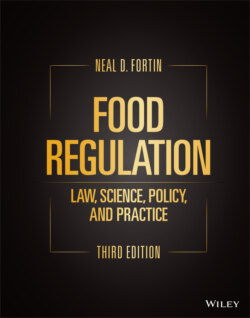Читать книгу Food Regulation - Neal D. Fortin - Страница 37
Self‐Incrimination
ОглавлениеUnder the Fifth Amendment’s protection that no person shall be compelled to be a witness against himself in a criminal case, a person may refuse to answer official questions if the answers could be used as evidence against them in a criminal prosecution. This right applies not only to questioning by the federal government, but also through application of the Fourteenth Amendment, to questioning by state and local governmental agencies.
However, the Fifth Amendment protection against self‐incrimination has limited applicability to agency authority to see records or require the production of documents kept by a food establishment. Largely this is because the privilege against self‐incrimination is a personal one and does not extend to corporations and similar unincorporated collective entities or associations.41 In addition, this privilege does not extend to the agents or custodian of the records of corporations and other collective entities.42 Nor does the privilege extend to the sole proprietor of a business to withhold records kept under a legitimate regulatory program.43 For example, the Fifth Amendment provides no privilege to withhold the time and temperature records a company is required to keep under food safety regulations.
On the other hand, the privilege against self‐incrimination could apply a law requiring documentation of criminal activity. For example, bookies (those running an illegal gambling operation, or “bookmaking”) cannot be compelled to register their occupation because it would be compelled self‐incrimination.44 The difference here is the requirement concerns inherently criminal activity, while required food establishment records are essentially noncriminal and regulatory in nature.
Nonetheless, when the records and reports required to be produced by food establishments and supplied to regulatory agencies could conceivably lead to criminal prosecution, there can be a concern over the reluctance to create incriminatory records. This reluctance for candor in the records can inhibit the purpose of certain self‐regulatory measures. For instance, the requirement to document deviations from time or temperature controls and correspondingly take corrective actions is an important preventative means in keeping safety issues from reaching the consumers. If the concern over self‐incrimination prevents the effectiveness of such controls, this potential conflict has been avoided by making it a criminal offense to fail to maintain and report such records, but forbidding their use for criminal prosecution.45
